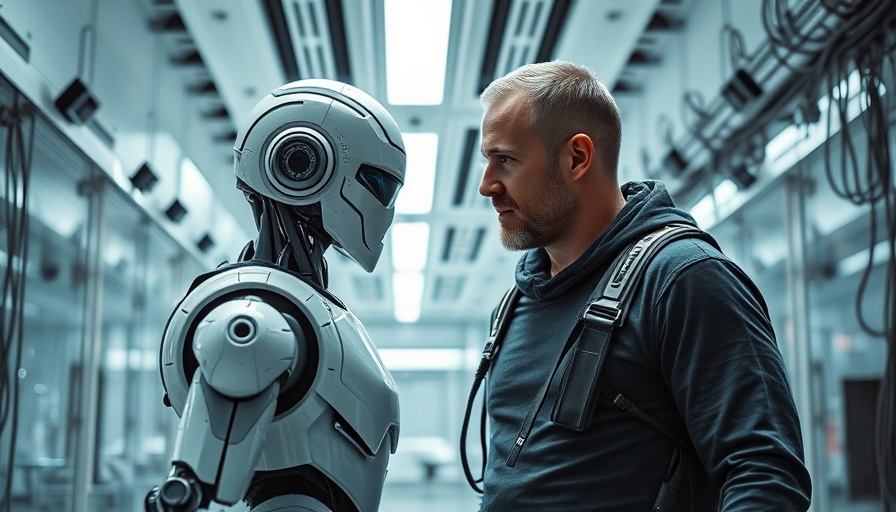
The Rise of AI Law Enforcement: Protecting Public Spaces
In a groundbreaking development at Thailand's Song Krun Festival, the Royal Thai Police unveiled their latest technological endeavor: AI Police Cyborg 1.0, a humanoid-style robot committed to enhancing safety during crowded public events. Equipped with advanced surveillance capabilities, this robotic cop utilizes 360° cameras and real-time facial recognition to monitor and report suspicious activities, ensuring a safer environment for festival-goers.
In First Humanoid AI Cop 'ROBOCOP' Shocked The Internet, the discussion dives into groundbreaking advances in AI technology, exploring key insights that sparked deeper analysis on our end.
This kind of innovation represents a significant shift in public safety strategy, where traditional policing merges with artificial intelligence, highlighting a growing trend where human oversight is augmented by autonomous technology. As incidents of large gatherings sometimes lead to disputes or threats, deploying AI systems can mean quicker responses and proactive interventions, potentially preserving peace during large celebrations.
Human Emotions Reflected: The Future of Emotional Robots
Meanwhile, in the realm of emotional intelligence, Disney Research has introduced a humanoid robot capable of mirroring human emotions in real-time. This move signifies an exciting step in interactive AI, raising the bar on how machines integrate into our day-to-day lives. With a design that captures expressions such as shyness or excitement, these robots have the potential to revolutionize customer experiences by employing emotional engagement strategies, especially in service industries.
For business owners, this development offers new insights into enhancing interaction with customers. Imagine a scenario where a customer walks into a store and is welcomed by an AI that not only recognizes them but also senses their mood and responds accordingly. This could redefine customer service strategies, showcasing how AI can foster deeper connections between brands and consumers.
Marathon Madness: Robots Compete but Face Limitations
Transitioning to Beijing, a striking spectacle unfolded with the first human vs. humanoid half marathon. The event showcased 21 bipedal robots attempting to outrun 10,000 human participants. Despite their mechanical prowess, the robots finished significantly behind their human counterparts, emphasizing that while robotic technology can be impressive, practical applications may still lag behind expectations.
This event provides a dual perspective: inspiring awe with technological achievements while also exhibiting the limitations that come with them. It raises questions about how businesses can assess the readiness of AI technologies, especially when considering investment opportunities in robotics and AI. As robots are expected to play more significant roles in industries, it’s essential to evaluate their current capabilities compared to human standards.
AI in Hospitality: The Future of Guest Experiences
In another innovative leap, Las Vegas is set to launch the world’s first AI-operated hotel, Autonomous, tailored to offer guests a tech-savvy lodging experience. From personalized digital check-ins to AI-driven concierge services, this hotel exemplifies how artificial intelligence can redefine customer service in the hospitality industry.
Such advancements present exciting opportunities for business owners, particularly those in the tourism sector, to enhance operational efficiency. Imagine implementing AI marketing software to analyze customer data and preferences, subsequently tailoring services to fit their needs better. This kind of personalization can not only enhance guest satisfaction but also improve business outcomes.
Revolutionizing Grocery Supply Chains with AI
Lastly, Okado’s automated grocery picking system highlights how AI is transforming the supply chain landscape. By processing millions of items with incredible precision, these robotic arms exemplify how leveraging AI can lead to unparalleled efficiencies in logistics and inventory management. As this technology evolves, businesses must consider integrating such systems to stay competitive.
For business owners, embracing AI-driven solutions like Okado's could lead to significant breakthroughs in managing supply chains. Investing in AI marketing software could complement such operational shifts, positioning companies to capture evolving market demands swiftly.
In conclusion, the landscape of artificial intelligence presents dynamic opportunities across various industries, from law enforcement to hospitality and beyond. As technologies continue to evolve, businesses must adapt to leverage these innovations effectively. GET YOUR OWN AI ASSISTANT, and explore how AI can reshape your business strategies for the better.
 Add Row
Add Row  Add
Add 




Write A Comment